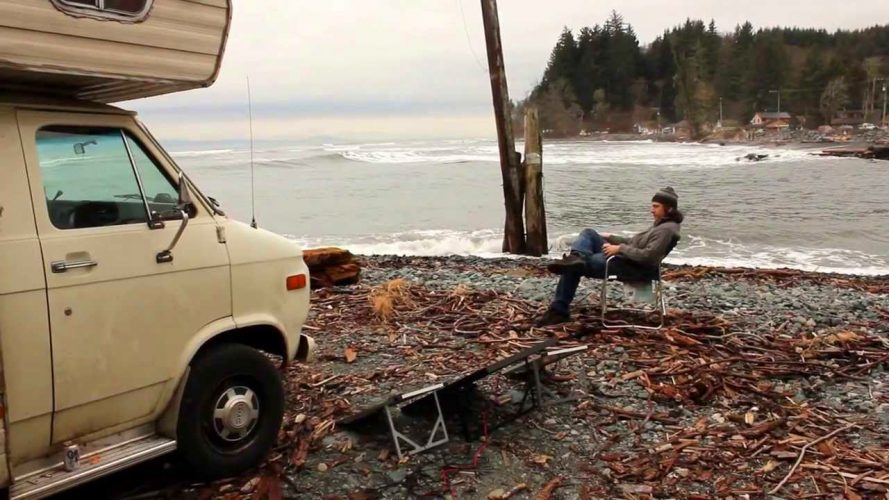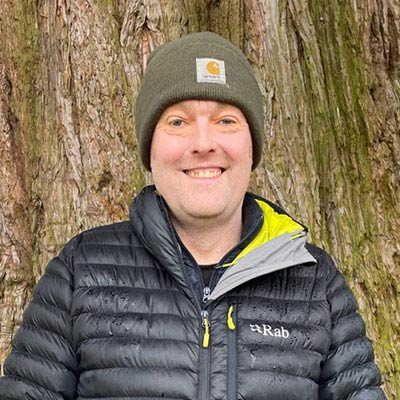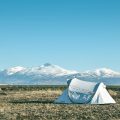Last Updated on December 9, 2019 by Dean Anderson
We all want to enjoy a brilliant camping experience but don’t want to pay through the nose for expensive campsites. One of the joys of camping is that you’re able to be one with nature, and sleep in the great outdoors. It’s something you should be able to do for free. And, with boondocking, you can! So what is boondocking or dispersed camping as it’s otherwise known?

Boondocking is a term coined over here in the USA. It’s become incredibly popular amongst campers looking for free thrills. In this guide, I’ll tell you everything you need to know about boondocking or free camping. From describing what it entails, to some handy etiquette tips, all the info is found below:
What is Boondocking? A Boondocking Definition
The simplest definition of boondocking is that it’s remote location ‘dispersed camping’. What do I mean by dispersed camping? I’m talking about camping outside of properly developed campsites. It’s all about taking yourself away from the typical campgrounds, and staying somewhere different. Generally speaking, boondocking is allowed on any public lands that are close to a road. The aim is to drive your RV, and pull up at a random location, then stay a couple of nights.
Funnily enough, some of the more popular boondocking sites include shopping mall car parks and Wal-Mart! Seasoned boondockers will tell you to look for places that allow overnight RV parking. This means you can park up, and camp for a few days for free. It’s also suggested that you avoid any visibly rough areas. Technically speaking, you can boondock in public streets, but you’re likely to get hassled. If you want the best experience possible, stay away from crowded areas and look for something quite remote, unique and beautiful.
And, boondocking doesn’t have to be done in inner city areas. A lot of people enjoy camping out in national forests. However, these days, you can be charged a large fee to camp there. But, with boondocking, you look for areas of the forest that aren’t part of the developed campgrounds. Find a place to park up, and bring all your important camping supplies. Then, you can enjoy a proper outdoor camping experience, without the hassle of having to pay.
Why Should You Go Boondocking?
Now, you might be reading this and wonder why people go boondocking? Typically, people do this because it saves money while camping. And, it’s the perfect way to get away from modern society and spend some time outside, enjoying nature. In fact, a lot of people see boondocking as a way of life. They travel around the country staying in different places and experiencing all sorts of cool things. Obviously, I’m not saying you should pack up your things and disappear from society altogether. But, if you want a fun camping trip, that’s different to the norm, then you should try boondocking.
Dispersed Camping Tips & Tricks
There are a few tips and tricks that experienced boondockers will often talk about. By doing these things, you can make boondocking even better.
Don’t Outstay Your Welcome
The first tip is to make sure you don’t outstay your welcome. It’s recommended that you don’t spend too much time camping in one place. If you do, then you could draw too much attention to yourself. It increases your chances of being spotted by a park ranger or a nervous citizen that reports you to a Ranger. Plus, it’s seen as rude to park up in the same place and stay for ages. That’s not boondocking; it’s squatting!
Park Close To Roads
I briefly mentioned this earlier on, but you need to park close to a road. The reason for this is that it allows you easy access with your RV. If you have to leave quickly, then you’re out and driving in a flash. Also, parking too far away from the roads means you’re driving on forest/woodland for a longer time. As such, you might damage it and ruin the natural habitats of the local wildlife.
Respect Nature
The previous tip brings us nicely onto my third boondocking tip; respect nature. Don’t go around chopping down trees or digging things up so you can fit your RV in a good camp spot. Leave things as they are, don’t mess with your surroundings. The big appeal with camping is that you get to enjoy your natural surroundings. If you start chopping things down to make it easier for you, then you’re ruining this.
Properly Dispose Of Your Waste
Disposing of your waste refers to two different things here. Firstly, any trash that you accumulate needs to be thrown away properly. You can’t just leave it at your campsite when you leave. Keep it collected, and throw it in the nearest bin you drive past. Similarly, any human waste has to be disposed of properly. Again, you can’t just leave it on the floor. Not only does this look horrible, but it’s hazardous to other campers that might come along after you. The best way to dispose of human waste is to dig a little hole and then cover it up.
Park On Flat Land
Another top tip for RV drivers is to ensure you park on flat, stable, land. Parking on a hill presents many dangers. The most obvious of which is that your RV can easily roll down the hill if you forget to put the handbrake on. You should also check that the ground is stable and easy for you to drive on. The last thing you want is to park in a mud pit and get your RV stuck.
Have An Excuse At The Ready
If you boondock in national parks, then you might run into some Rangers. As you’re camping away from the designated campground, you could be in trouble. One handy tip is to have an excuse ready, just in case this happens. A lot of boondockers bring binoculars and bird watching equipment so they can claim this is why they’re in that location. If you are asked to leave, then do so without any fuss, you don’t want to cause arguments.
Boondocking or dispersed camping is a brilliant way to take camping to the next level. Step outside the expensive campgrounds, and enjoy things your own way!

Eight years ago, I took a risk and left a miserable office job to follow a lifestyle career that involved my love for the great outdoors. I’ve taken my love for camping, hiking and travel to the next level by running my small campground with a friend near Portland, Oregon. It’s for way less money but this has truly been a dream come true and the running involves lots of family and friends.
The next evolution of that was to get online and start allcampingstuff.com. At our campground, I spend a lot of time setting up camping equipment for customers and disposing of the garbage products they leave behind. If I can help just a few people with advice on good camping gear, then this website venture will be worth it.
So, if you want to avoid the duds and spend your money wisely you’ve hopefully come to the right place.








